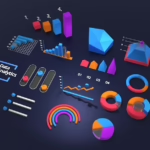The evolution of smart technology has been one of the most significant advancements of the 21st century. Initially, the term “smart” was primarily associated with devices that could connect to the internet, allowing for remote control and automation. However, as technology has progressed, the definition has expanded to encompass a wide range of devices equipped with artificial intelligence (AI) and machine learning capabilities.
This transformation has led to the development of smart homes, smart cities, and even smart healthcare systems, all designed to enhance efficiency and improve quality of life. The proliferation of smartphones has played a pivotal role in this rise. With millions of users worldwide, smartphones serve as the central hub for managing various smart devices.
The integration of voice assistants like Amazon’s Alexa, Apple’s Siri, and Google Assistant has further accelerated this trend, making it easier for individuals to interact with their devices. As a result, smart technology is no longer a luxury but a necessity for many, shaping how we communicate, work, and live.
Key Takeaways
- Smart technology is revolutionizing the way we live and work, making tasks easier and more efficient.
- From everyday tasks to home life and the workplace, smart technology is becoming increasingly integrated into our daily lives.
- The benefits of embracing smart technology include increased productivity, convenience, and improved quality of life.
- Despite the many advantages, there are challenges to adopting smart technology, such as cost, security concerns, and the learning curve.
- As smart technology continues to evolve, it is important to embrace and adapt to these advancements to stay ahead in an increasingly digital world.
Smart Technology in Everyday Life
Smart technology has seamlessly woven itself into the fabric of everyday life, transforming mundane tasks into streamlined processes. From smart thermostats that learn user preferences to smart refrigerators that can track inventory and suggest recipes, these innovations are designed to enhance convenience. For instance, a smart thermostat can adjust the temperature based on the time of day or occupancy, leading to energy savings and increased comfort without requiring manual adjustments.
Moreover, wearable technology such as fitness trackers and smartwatches has revolutionized personal health management. These devices monitor vital signs, track physical activity, and even provide reminders for medication. By collecting data over time, they empower users to make informed decisions about their health and wellness.
This integration of smart technology into daily routines not only simplifies tasks but also promotes a more proactive approach to personal well-being.
How Smart Technology is Streamlining Daily Tasks
The impact of smart technology on daily tasks is profound, as it automates processes that once required significant time and effort. For example, robotic vacuum cleaners can autonomously navigate homes, cleaning floors without human intervention. This allows individuals to focus on more important activities while maintaining a clean living environment.
Similarly, smart kitchen appliances can automate cooking processes, such as preheating an oven or adjusting cooking times based on recipe inputs. In addition to home automation, smart technology enhances productivity in various aspects of life. Calendar applications integrated with AI can analyze schedules and suggest optimal times for meetings or tasks.
This not only saves time but also reduces the cognitive load associated with planning. By streamlining these daily tasks, smart technology enables individuals to allocate their time more effectively and pursue their interests or responsibilities with greater ease.
The Impact of Smart Technology on Home Life
Smart technology has fundamentally altered the dynamics of home life by fostering greater connectivity and control. Home automation systems allow residents to manage lighting, security, and climate from a single interface, often through their smartphones. This level of control enhances security; for instance, homeowners can monitor surveillance cameras in real-time or receive alerts when unusual activity is detected.
Furthermore, smart technology promotes energy efficiency within households. Smart meters provide real-time data on energy consumption, enabling families to identify patterns and adjust usage accordingly. This not only leads to cost savings but also contributes to environmental sustainability by reducing overall energy demand.
As families embrace these technologies, they cultivate a more efficient and secure living environment that aligns with modern lifestyles.
Smart Technology in the Workplace
In the workplace, smart technology is revolutionizing how businesses operate and interact with employees. The integration of AI-driven tools enhances decision-making processes by providing data analytics that inform strategies and operations. For example, customer relationship management (CRM) systems equipped with AI can analyze customer interactions and predict future behaviors, allowing businesses to tailor their marketing efforts effectively.
Moreover, remote work has been significantly facilitated by smart technology. Collaboration tools such as video conferencing software and project management applications enable teams to communicate seamlessly regardless of location. This flexibility not only boosts productivity but also enhances employee satisfaction by allowing for a better work-life balance.
As organizations continue to adopt these technologies, they are likely to see improvements in efficiency and employee engagement.
The Benefits of Embracing Smart Technology
Embracing smart technology offers numerous benefits that extend beyond mere convenience. One of the most significant advantages is increased efficiency; tasks that once took considerable time can now be completed in a fraction of the time. This efficiency translates into cost savings for both individuals and businesses, as resources can be allocated more effectively.
Additionally, smart technology fosters innovation by enabling new ways of thinking and problem-solving. For instance, data collected from smart devices can lead to insights that drive product development or improve customer service strategies. As users become more accustomed to leveraging these technologies, they are likely to discover new applications that enhance their lives further.
Ultimately, embracing smart technology positions individuals and organizations at the forefront of progress in an increasingly digital world.
Overcoming Challenges in Adopting Smart Technology
Despite the myriad benefits associated with smart technology, challenges remain in its widespread adoption. One significant hurdle is the concern over privacy and data security. As devices collect vast amounts of personal information, users may hesitate to fully embrace these technologies due to fears of data breaches or misuse.
It is crucial for manufacturers and service providers to prioritize robust security measures and transparent data policies to build trust among consumers. Another challenge lies in the digital divide; not everyone has equal access to smart technology due to socioeconomic factors. Ensuring that all individuals can benefit from these advancements requires concerted efforts from governments, businesses, and communities to provide access to necessary resources and education. By addressing these challenges head-on, society can work towards a future where smart technology enhances the lives of all individuals rather than creating disparities in access and opportunity.




